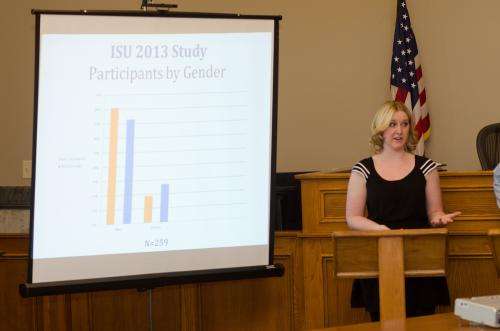Student research: Job status, income factors in drug court success

People who work even part time are more likely than the unemployed to graduate from Vigo County's Drug and Alcohol Court. Those with annual incomes above $30,000 are more successful in the program than lower wage earners and women succeed at a higher rate than men.
Those are among the findings of an analysis of the alternative sentencing program by a team of five Indiana State University students.
Of 259 participants between Jan. 1, 2008 and Dec. 31, 2010, 158 were successful, an increase of 68 since a 2007 review of the program by NPC Research of Portland, Ore.
"At the beginning it was pretty daunting task and time was a huge factor, but overall we found some pretty good findings," said Evan Norris, a senior political science major from Greenwood.
In the Drug and Alcohol Court, people can plead guilty and, if they are successful in the program, they will not be prosecuted. If people fail to complete the program, they will be sentenced.
Indiana State students took on the study after political science instructor Katie Butwin contacted Paul Southwick, drug court coordinator, and Jimmie Bowman, the court's director, about wanting to give students an experience where they could do in-depth learning about the court system, data collecting and analysis techniques.

The 10-week project gave the opportunity for the students to work closely with the Vigo County Drug and Alcohol Program.
By researching prior drug and alcohol courts and observing court trials on a first hand basis, students gained a better understanding of what happened during the trials. They started with the program assessment evaluations, by examining court files for the three-year period. They collected characteristics about the participants in the program such as age, gender and ethnicity and looked at what kind of charges led them to involvement in the program. More than half of all defendants in the program were there because of drunken driving, 14 percent due to possession of methamphetamine and 9 percent each for possession of marijuana and possession of controlled substances. Only eight individuals initially faced charges of dealing in illegal substances.
Once all the evaluation data was collected they started to analyze it by gender, age, education and other criteria. The students learned how to assess statistics through a software package and learned how to manipulate data.
"They had to adapt to some changes with the way things were going to work, which happens all the time for research projects," Butwin said. "Even though they were on a time crunch to get the data done, they all worked extremely hard."
The students found that graduates of the program are more likely to be of higher socioeconomic status. 85 percent of participants earning $30,000 per year or more graduated from the program, a rate nearly twice that of participants with annual incomes below $5,000.
"We worked extremely hard on this research project and see it all come together is very rewarding to me, said Olivia Finley, a junior political science major from Terre Haute."
In addition to reporting their findings to court administrators, the students had some recommendations on how to improve the program. Their suggestions included standardizing information gathered on all participants, investigating the education level and employment status of participants upon graduation or termination from the program and evaluating a shift to alcohol -related addiction and charges
"These students did wonderful; they were very professional and drove themselves very well. I couldn't have asked for a better group of students to work on this project," said Southwick.
The students have been accepted to present their research at the Academy of Criminal Justice conference in Philadelphia in February.
In addition to Norris and Finley, students involved in the project were senior Mallory Pugh, a senior criminology and criminal justice major from Terre Haute; Drew Snyder, a senior criminology and criminal justice major from Brazil; and Trevin Thalheimer, a junior political science major from Brookville.
"This is a big deal for undergraduates and they have done a really great job and they have really enjoyed it," said Lisa Decker, associate professor of criminology and criminal justice.
Provided by Indiana State University
















